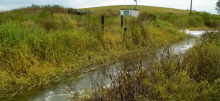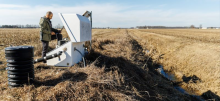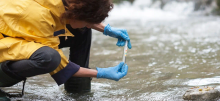
All About the Water Alliance Hubs
Water science is broad and multi-faceted. It’s studied by experts not just in natural and physical sciences, but also in social science, engineering, public health, to name a few. The MSU Water Alliance was created to bring these disciplines together and encourage collaboration to solve problems.

Medema Receives Lee Kuan Yew Water Prize
Gertjan Medema, a Dutch microbiologist, was honored with the 2024 Lee Kuan Yew Water Prize. He’ll officially accept the award at the Singapore International Water Week in June.

Rose Receives Guardian of the Environment Award
Joan Rose, Homer Nowlin Chair in Water Research, was honored as a “Guardian of the Environment” for her outstanding lifetime of effort by the Great Lakes Environmental Festival in Manistee.

Rural Water Crisis Vital to Health of the Planet
Water issues there have escalated into a dire situation that demands immediate attention. The groundwater we count on to supply America’s rural residents is facing a critical risk of overextraction and contamination

2024 Innovation Celebration Recap
The Michigan State University Innovation Center hosted its annual Innovation Celebration on campus at the Kellogg Center on Tuesday, April 2nd, 2024.

MSU Works with Farmers to Fight Climate Change by Improving Water Quality and Drainage
The Isley family of Lenawee County and Michigan State University are working together to improve the water quality and reduce toxic algae in the Lenawee County area.

Making a Splash in Water Research
Michigan State University is committed to finding solutions to modern problems that jeopardize the availability of clean, safe water for natural ecosystems and for human uses, including drinking, agriculture and so much more.

New EPA PFAS ruling: MSU experts provide overview of changes
Municipal water systems must remove “forever chemicals” from their tap water under a new rule issued by the Environmental Protection Agency meant to prevent deaths and serious illnesses linked to the substances.

Ashby and Philip Earn Goldwater Scholarships
Libby Ashby and Aaron Philip have earned the prestigious Barry M. Goldwater Scholarship, becoming the university’s 54th and 55th Goldwater Scholars.
